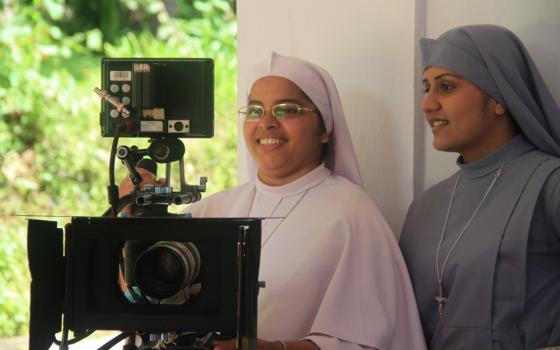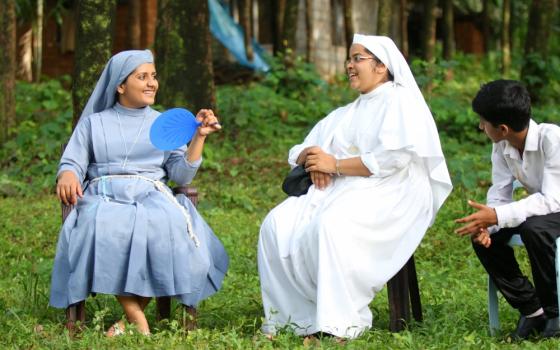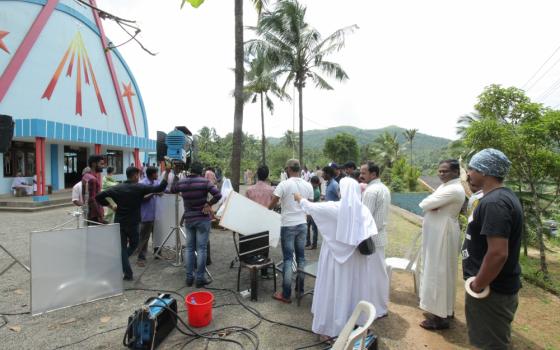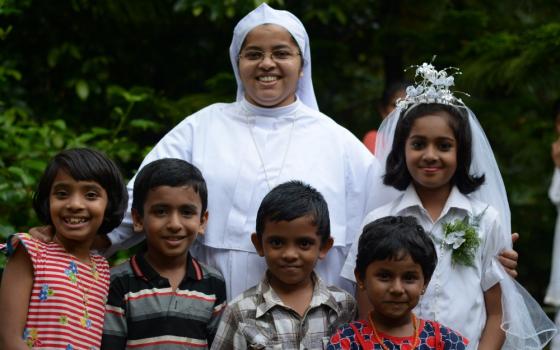Sr. Jisha Jiya is the first Catholic woman religious in India to direct and produce a feature film.
The 39-year-old Medical Sister of St. Joseph made the film "Ente Vellithooval" ("My Silver Feather") in Malayalam, the language of the southern Indian state of Kerala, where she lives and works. The movie tells the story of the impact of a Catholic nun on a modern family.
Jiya also wrote the story, script, dialogue and one of three songs for the two-and-a-half-hour feature film, which was released in May. Her film was played in a few select theaters, schools, colleges, churches and related institutions in Kerala. Jiya plans to screen it outside Kerala wherever people from the state live.
Jiya is in charge of a medical laboratory attached to her community's St. Sebastian's Hospital in Cherupuzha, a small town in the northern part of Kerala.
While her community and friends encouraged her, others dissuaded her. She recalls people asking her why a Catholic nun had to make a movie and why she couldn't lead a quiet life of prayer and silence in the convent. She says she completed the film with God's abundant blessings that provided her sheer grit and determination.
GSR: What prompted you to make "Ente Vellithooval"?
Jiya: I was always aware of the reality that media have the potential to spread goodness and wickedness in society. A few years ago, I began to feel that I could make a feature film based on goodness and values to help people and families to become better humans. That was the time I published a book, Easoyicku oru pookkuda [A floral umbrella for Jesus], comprising 20 short stories I wrote in Malayalam. The book was well received. Many told me the stories made a lasting impact on them and helped change their bad habits. If short stories can impact people, a mass medium such as cinema can play a much bigger role in influencing them. This thought led me to produce the film.
What did you hope to achieve through the film?
There was a time when consecrated people were respected and loved. That is no more. Today, such people are undervalued and ridiculed. My film is an attempt to tell how consecrated people lead a life of sacrifice and dedication to people and society.
India has produced several films in the name of Christianity. Many are produced not to convey Christian virtues and values, but for economic gain. There are cases where such films fully or partially damaged the image of Christians and insulted their faith. I wanted to make a humble contribution to change this, and made "Ente Vellithooval," which I consider is the product of God's plan.
How did you get the idea of producing a movie?
I had never thought or planned to make a film. I believe it was God's plan that was actualized through me.
When the church celebrated the Year of the Consecrated Life [Nov. 30, 2014-Feb. 2, 2016], my story on religious life was published in a Christian publication for children. I felt that story must reach a wider audience. After much reflection, I was convinced the story could make a lasting impression on people's minds through a film.
What message did you want the movie to convey?
Today's families go through more stresses, tensions and problems than before. When parents are busy amassing wealth, their children don't seem to get enough love, care and guidance. It is in such families that "Ente Vellithooval" becomes relevant. The film is an attempt to prepare parents to accept children as God-given gifts.
What is the movie about?
The story revolves around a sister who sacrifices herself for the betterment of a family. The film's first half centers around wealthy parents and their only son, Toms. The parents are busy making money and forget to raise Toms. They never guide him or give him love and affection.
As a result, the son becomes wayward. He grows up as an angry person without any sense of love or forgiveness for others. His only aim in life is to harm others.
The story comes alive when Sister Merina befriends the family. She prays and fasts for changing the family, especially Toms. She forgives and loves them, and eventually, her sacrifices pay off. Her involvement in the family changes Toms and his parents.
In the second half, we see a changed family that radiates love, grace, goodness and kindness. With the intervention of the sister, Toms reforms and eventually becomes a priest. The film conveys the message that one must be kind and caring for others. It also helps children to relate to consecrated life. The film could be watched by all family members.
What were the challenges you faced while making the movie?
I know of lot of professional filmmakers who face many challenges and crises. Since I am an outsider, a woman and a religious, my challengers were even greater. One of them was my lack of formal training about the techniques of filmmaking. Another problem was the budget. I thought I could finish it on a small budget. As days passed, the budget went up. So I had to approach many people for donations and loans.
A few people discouraged and criticized me. Some asked, "How dare you do this where even billionaires have tried and lost their money?" "Who will support a sister if she makes a film?" "Can't you lead a quiet life reciting some known prayers in a convent?"
But I was not the one to be cowed. God gave me the grit and determination to overcome challenges to forge ahead and to complete the film.
How did you raise the funds?
Filmmaking is an area where one doesn't know where the money comes from and where it goes. Shortage of funds was my major problem. I had to ask for donations and loans from relatives, friends and well-wishers.
Many people gave me cash as a donation. Many people gave me interest-free loans. The total cost of the film was 4 million rupees [about $62,000]. I have repaid 1 million rupees. The balance is yet to be repaid.
Was your congregation supportive?
My congregation gave me all possible support, encouragement and financial grants. I had asked for their permission to do the film, which they readily gave me.
In the beginning, members of a Christian youth group had promised to help raise funds for the film. Due to some unknown reason, they withdrew at the last moment. So I had to approach my congregation for some funds, which they provided before the completion of the film.
What kind of audience did you have in mind when you worked on the movie?
My aim was to convey a message to children who are growing up. Moreover, I felt I must present to society the sacrifices that consecrated people make in the society. The film was made with a focus on Christian families.
What has been the response to the movie from the public so far?
People were curious to watch the film as it was scripted, directed and produced by a sister. Also, people look at the film as the result of the prayerful support and encouragement of many people.
I could sense that people wholeheartedly accepted the message because it is rooted in consecrated life. I was amazed to see how the message influenced the audience and how it changed their lives. This has helped me forget the challenges and pains that I had undergone. People tell me after watching the movie that it was like attending a Mass or a prayer meeting or listening to a homily.
Do you plan to do another film?
If God wills, yes. But I will think about it only after clearing the current debt. The realization that film can spread the Gospel values motivates me to do another film. Moreover, after learning a lot of valuable lessons from doing my first film, I feel future films would be much better.
What led you to become a nun?
My family background, the lives of my parents and of consecrated people whom I met during my younger days influenced me to become a sister. I was also encouraged by regular family prayers, Mass and reading about saints' lives.
It was my mother who through her prayers and support developed and nurtured my childhood wish to become a sister. When I was growing up, watching my parents showing their love, kindness and concern for others, I got an urge to do it more and better. By then, I became convinced that it was only by becoming a religious woman that I could love and care for others. At the age of 22, I became a sister.
Can you tell us about your life before becoming a sister?
My parents have 10 children. I am the fourth. Three have become women religious. After my schooling, I joined the convent. I am privileged to have been born in a talented family. We all had sports and artistic talents. My parents considered their 10 children as gifts from God. They gave us all encouragements to show our artistic talents. During my school days, I used to be a leader and organizer for other students.
You are well known as a storyteller. How many stories have you written and published?
I used to write short stories in Malayalam during my growing-up years. Most were written for school competitions. I couldn't preserve them after becoming a sister. In the last five years, I have written more than 50 new stories. A book of my stories is in the offing. I have also been writing stories for a church-related children's magazine called "Kaduku Mani" ("Mustard Seed"). I write stories for children to spread value-based messages.
[Philip Mathew is a journalist based in Bangalore, southern India. He edits Asia Pacific Ecumenical News and writes for Matters India, a news portal that focuses on religious and social issues.]




